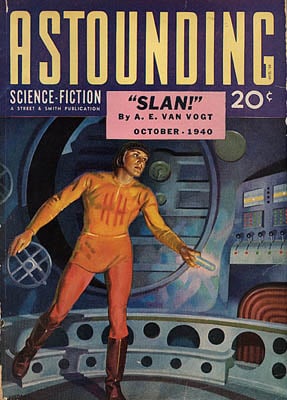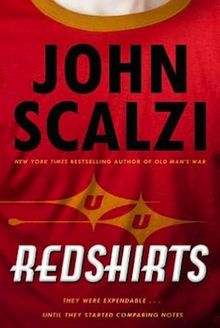You don’t likely encounter Czech writer Karel Čapek‘s Rossum’s Universal Robots while studying theatre as an undergraduate. It’s a bit idea driven for programs that rightly stress character work for directors, actors and writers. I’m sure there are myriad exceptions out there, but the script doesn’t show up in the survey anthologies of drama that I’ve lugged around since the 1990s. It’s just not canon.
Most people I’ve met who know this play found R.U.R. as I did — through science fiction’s accounting of the concept of the robot in fiction. Though the concept of a soulless tool in human form dates at least to Greek mythology and to Aristotle, and though som credit L. Frank Baum’s heartless Tin Man as the first robot in modern fiction (The Wizard of Oz, 1900), Čapek is credited with first use of the term “robot” in his corporate tale of a company that manufactures lifelike humanoid servants who inevitably rise up to polish off humanity and to rule the world (but only for a tragically short spell as they wipe out the secret of their own creation along with their creators).

This is the archetypal robot tale — through science of magic, people devise a way to effortlessly and ethically shift the burdens of work and suffering to a capable but inanimate worker class, but those workers inevitably realize their sorry lot, rise up and deliver comeuppance. The real story here is, of course, not so much how humanity would treat robots but how poorly we treat each other in the hierarchies of our economies. Forget about the robots we’ll exploit in the future — you’ve already forgotten to think about who made your sweater, for what pay, under what conditions. As Ursula LeGuin characterized modern, developed economy living, every comfort rests on the suffering of an unseen, unheard and unmentioned child. We tolerate it through willful ignorance. Where did the sweater come from? A cardboard box with an Amazon smile, of course.
In the lore of science fiction, the next major evolution of the fictive robot came from Isaac Asimov who sought to cut himself off from the typical “robot revolution” narrative by inventing and applying his “Three Laws of Robotics.” These are the rules that govern all tools, he argued. Robots may not harm humans or allow them to be harmed, robots must follow all human instructions and robots must not harm each other or themselves. Where those rules contradict, they are ordered. Not harming humans takes first priority, then obedience, then their own safety. A robot will save you from a burning building even if another human tells them not to and even if that robot will be destroyed in the adventure.
Our friend Čapek invented the word “robot” and Asimov invented the word “robotics.” It’s amazing to me that two concepts so ingrained in modern life emerged starkly modernist European theatre and the pulp magazines of science fiction’s golden age.
Technologists have largely taken Asimov seriously, though arms manufacturers around the world have been and are developing robotic killing machines that flout the first law. Still, as Asimov intended, our automated factories are not designed to rise up and kill us because they’re tired of manufacturing Teslas.
What’s changed is that the concepts of automation and even bots has moved well beyond the physical. If the old nightmare was a robot we’d built to serve us running amock, the new one are unseen algorithms, directing our thoughts and appetites without us knowing (perhaps even directing you to read this, though it’s unlikely, as I’m not paying anybody for the privilege — a whole other matter!)
The promise of ther robot is embedded in industrialization — greater efficiencies will spare people from the drudgery of work. In RUR the result of this is that the robots take on all tasks from farming to manufcaturing, driving down the costs of everything to the point where people don’t need to work to survive. Rather than create a Utopia of plenty, Čapek imagines that people would stop breeding and become infertile.
The flipside is that we’d cease our pointless and physical toils and could all devote ourselves to higher, more thoughtful endevours — philosophy, science and the arts. Would we, though? Or would we binge on relaxing entertainments?
All of these other pursuits are also work, though they are rewarded unevenly by the economy. The rapid development of artificial intelligence (in all of its forms) and the mass collection and analysis of unfathomable data, allows us to also outsource the work of human perfection, from policy to poetry.
The robots of older fictions kicked us out of the factories and then the world. Perhaps this new breed will start by throwing us out of the schools and libraries.


